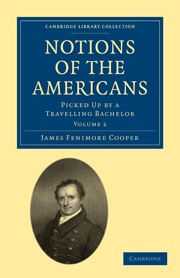Book contents
- Frontmatter
- Contents
- Lately Published
- LETTER I To the Count Jules de Béthizy
- LETTER II To the Abbate Giromachi
- LETTER III To the Same
- LETTER IV To the Count Jules de Béthizy
- LETTER V To the Baron Von Kemperfelt
- LETTER VI To the Abbate Giromachi
- LETTER VII To the Same
- LETTER VIII To the Count Jules de Béthizy
- LETTER IX To the Professor Christian Jansen
- LETTER X To Sir Edward Waller, Bart
- LETTER XI To the Same
- LETTER XII To the Professor Jansen
- LETTER XIII To the Count Jules de Béthizy
- LETTER XIV To the Abbate Giromachi
- LETTER XV To the Professor Christian Jansen
- LETTER XVI To Sir Edward Waller, Bart
- LETTER XVII To the Same
- LETTER XVIII To the Same
- LETTER XIX To the Count Jules de Béthizy
- LETTER XX To the Same
- LETTER XXI To Sir Edward Waller, Bart
- NOTES
LETTER XIV - To the Abbate Giromachi
Published online by Cambridge University Press: 29 August 2010
- Frontmatter
- Contents
- Lately Published
- LETTER I To the Count Jules de Béthizy
- LETTER II To the Abbate Giromachi
- LETTER III To the Same
- LETTER IV To the Count Jules de Béthizy
- LETTER V To the Baron Von Kemperfelt
- LETTER VI To the Abbate Giromachi
- LETTER VII To the Same
- LETTER VIII To the Count Jules de Béthizy
- LETTER IX To the Professor Christian Jansen
- LETTER X To Sir Edward Waller, Bart
- LETTER XI To the Same
- LETTER XII To the Professor Jansen
- LETTER XIII To the Count Jules de Béthizy
- LETTER XIV To the Abbate Giromachi
- LETTER XV To the Professor Christian Jansen
- LETTER XVI To Sir Edward Waller, Bart
- LETTER XVII To the Same
- LETTER XVIII To the Same
- LETTER XIX To the Count Jules de Béthizy
- LETTER XX To the Same
- LETTER XXI To Sir Edward Waller, Bart
- NOTES
Summary
You inquire concerning the state of religion in the United States. I presume you ask the question in reference to its outward and visible signs, since it is not to be supposed that a layman, like myself, is sufficiently versed in its mysteries to go deeper than that which is apparent.
You know there is no establishment. Congress is prohibited by the constitution from creating one, and most (I believe all) of the state constitutions have the same provision. In point of fact, there is none whatever. The clergy, and all that pertains, therefore, to religion, are supported by voluntary contributions, or by endowments that have been made by devises, gifts, and other private means.
The first point to be considered, is the number and the nature of the sects. If the Presbyterians and Congregationalists, between whom there exist mere shades of difference in discipline and opinion, shall be considered as forming one sect, they are certainly the most numerous. It is computed that they possess near three thousand congregations. The Baptists are known to have more than two thousand. Perhaps the Methodists rank next in numbers. The Protestant Episcopal church is greatly on the increase. I find, by the Ecclesiastical Register, that it contains ten bishops, and three hundred and ninety-four clergymen. Most of the latter are settled, and many have two or three congregations under their charge.
- Type
- Chapter
- Information
- Notions of the AmericansPicked Up by a Travelling Bachelor, pp. 305 - 332Publisher: Cambridge University PressPrint publication year: 2009First published in: 1828



